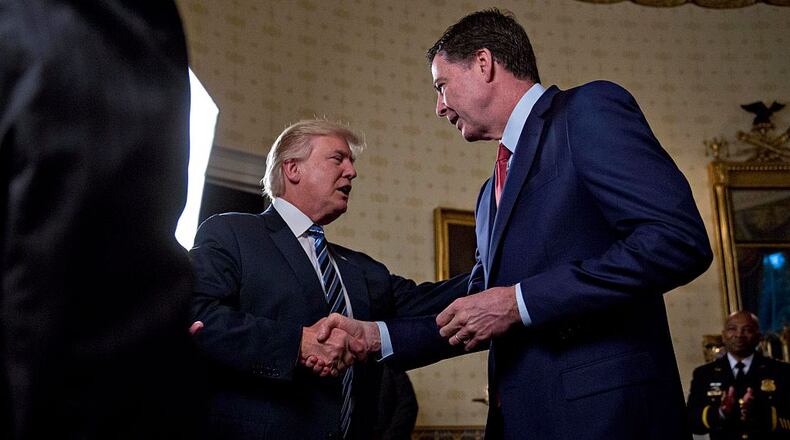The most damning detail so far about President Donald Trump’s firing of FBI Director James Comey isn’t about the timing. It’s that the White House wasn’t at all prepared for the blow-back.
It doesn’t look good that Trump fired Comey after a grand jury issued subpoenas — not indictments — in the Michael Flynn investigation. But to speak of this as a “constitutional crisis” is an inapt description of what’s really going on here.
First things first: The director of the FBI works in the Department of Justice, which is an agency of the executive branch, which is headed by the president. As such, the president is well within his constitutional authority to fire the director of the FBI. It is a sign of the insanity of our current political environment that this needs to be said, but there it is. (I might add, Comey’s removal with no nominee to replace him waiting in the wings — more on that in a moment — elevates as acting director a man who Trump and many of his supporters view as no friend of the president.)
It is also true that Congress is charged with overseeing agencies like the FBI. To the extent presidents from both parties have expanded executive power, the blame largely lies with legislators from both parties who let them get away with it.
There has never been a better time for Congress to rectify this situation. The skepticism from several Republican senators about the timing and rationale for Trump’s firing of Comey suggests they may be ready to take that oversight role seriously. That includes not only insisting on a replacement at the FBI whose credentials and independence are unquestioned but, in the meantime, keeping tabs on how Comey’s firing is affecting investigations.
Speaking of the FBI’s credibility, everyone needs to take a deep breath and acknowledge it had suffered greatly in the final months of Comey’s tenure, as he bungled the Clinton investigation first in the eyes of Republicans, then Democrats. Reasonable people on both sides should be able to conclude Comey was no longer a credible leader for an agency that vitally needs credibility.
So now we come to the part about preparation. By all accounts, the White House mismanaged the particulars of Comey’s dismissal in just about every imaginable way.
Trump reportedly expected it to be viewed as a “win-win,” not with extreme skepticism. Even some high-level administration officials didn’t know it was coming. There was no communications strategy to explain the why and when of the decision. Comey was caught off-guard by the move, which came as he was on the other side of the country, and wasn’t told of his dismissal personally. That the notification of his firing went instead by hand delivery to FBI headquarters, when Comey wasn’t even there, is another sign of mismanagement.
These mistakes were not made under time pressures. The only possible rationale for Trump’s choosing Tuesday as the day to fire Comey was the fact that was the date stamp on a memo by the deputy attorney general outlining Comey’s missteps in the Clinton investigation. But that’s no excuse for the haste.
As a result, if Trump were truly trying to regain control of the narrative over the FBI’s Russia investigation, as some reports have it, he has accomplished the exact opposite. Just like with his insistence on continuing to use social media no matter what problems it might create for him, Trump too often is his own worst enemy.
The crisis here, if such exists, is one of competence, not constitutionality.
About the Author
Keep Reading
The Latest
Featured


